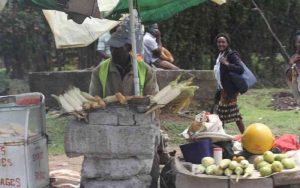In the past, the Easter season in Kenya was a highly anticipated time due to the festivities, family gatherings, and travel that came with it. Additionally, there was the Safari Rally, where rally cars would race through various routes in the upcountry. The drivers’ skills in sliding through mud and creating dust clouds thrilled Kenyans, even those who were not fans of the sport.

A maize vendor selling dried maize (mahindi choma) along Ngong road
However, today, many Kenyans feel that the Easter holiday is not the same. Even though the organizers of the revived rally in Naivasha have changed the dates to coincide with the Easter Weekend, as it was before, most Kenyans are too financially strained to be excited.
Despite the confidence expressed by the administration of President William Ruto that the country is moving in the right direction, many companies are laying off staff. Uncertainty has now enveloped parastatals after a recent meeting at State House, which hinted at changes that will result in job losses. Some employees are facing delayed salaries, while a health workers’ strike has caused inefficiencies in service delivery. Additionally, some school principals have decided to close early for the April holidays due to fears of further costs. A cross-section of Kenyans polled by The Standard said they plan to spend the weekend at work, at home, or in church and treat it like any other weekend.
“The Easter holiday is a time to share with those who are less fortunate. However, due to the current hardships that many Kenyans, including myself, are facing, it may not be possible to engage in charity events as we used to. Instead, I plan to spend the holiday period with my family at home, attend church events, and let the holiday pass like any other weekend,” said Andrew Nyabuto, a resident of Nakuru.
Eunice Wanjiku is a businesswoman from the city of Rift Valley. Due to the tough economic times, she cannot afford to spend on any celebrations and will be working throughout the Easter holiday. Although she recognizes the significance of the Easter period as a Christian, it is difficult for her to engage in avoidable spending during this time.
“I will celebrate Easter within Nakuru and won’t skip a day at my workplace,” she said.
Harrison Mutembei, who lives in Mombasa, expressed his desire to take his family to recreational places like the Jomo Kenyatta public beach at Pirates, and enjoy good food and drinks, but he is unable to do so due to financial constraints. He is currently focused on earning enough to provide for his family’s basic needs such as regular meals and school fees, and cannot afford any additional expenses.
Two weeks ago, just a few days before Easter, the 2021 edition of the World Happiness Report was released. The report ranked Kenya at position 114 out of 143 surveyed countries, which is a drop of three places from last year’s report where they were ranked 111th. This marks a reversal of a five-year trend where Kenya’s score had been on a sustained improvement trajectory. Unfortunately, this means that Kenya is currently considered an unhappy country. This gloom is not unfounded. The cost of many basic items has stayed up, while the earnings of many Kenyans have been eroded by high taxes.
The cost of electricity has gone up significantly over the past year, with a 42.7 percent increase in February for households that consume 50 units a month. For those who use 200 units, the cost has increased by 31.8 percent in the same period. Similarly, while fuel prices have dropped slightly in recent times, they have not yet returned to their February 2020 levels. At that time, a litre of super petrol in Nairobi cost Sh177, compared to today’s price of Sh199. The rains towards the end of last year and this year have helped bring down the cost of some food items, which is the reason that the inflation rate — which is a measure of the increase in the cost of goods and services – dropped to 6.3 percent in February this year from a high of 9.2 percent last year.
It is essential to note that the decrease in food prices has not affected all items equally. According to the Kenya National Bureau of Statistics (KNBS), the cost of beans, meat, carrots, and potatoes has risen compared to their prices in February of last year. Furthermore, there are ongoing labor disputes, with the most significant being the strike by health workers who have been on strike for several weeks now. Companies are planning to lay off more employees, and civil service jobs are also looking bleak. The government is implementing recommendations of the International Monetary Fund (IMF) by shutting down state corporations and merging others, spelling doom for many state employees who could be declared redundant. The high cost of living is perceived as the biggest challenge that the Kenyan economy is facing today. According to a report by the Ethics and Anti-Corruption Commission (EACC), more than half of Kenyans who were interviewed during the survey for the report said they perceived the high cost of living as the most critical problem in Kenya. This is followed by employment and poverty, which looked at from a certain angle are all related.
The high cost of living is, to a large extent, responsible for the rise of other social ills, including corruption, according to EACC.
High cost of living (50.6 percent) was perceived as the most critical problem facing the country today followed by unemployment (46.3 percent), poverty (41 percent), corruption (33.3 percent), unfavourable According to the National Ethics and Corruption Survey (NECS) published on Wednesday.
During these tough times, many Kenyans struggle to meet their daily needs. As Easter approaches, they will carry on with their routine chores and hope for the best.
By Isaac Sanya
